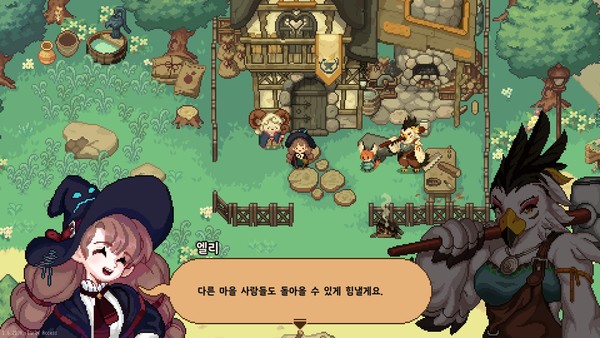Follow Ellie Blueriver, an apprentice witch, who accidentally oversleeps and misses her train to her “witch intern” town. However, she encounters a nearby small village, which is devastated by thorny, vine-like vegetation that destroyed houses and chased away most of its villagers. It is now up to Ellie to return the village back to its lively state. Welcome to the world of Little Witch in the Woods.
Created by the two-person team “Sunny Side Up”, Little Witch in the Wood was released on May 17 on PC and Mac through Steam in English, Korean, and Simplified Chinese. It is still in its early access stage, which means the game is a demo that is not yet complete. However, its charm quickly captured the Steam audience, reaching 5th in worldwide sales on Steam on May 18.

The game is heavily inspired by the acclaimed Stardew Valley, a rural farming simulator, where the player helps the slowly declining village by farming, fishing, and mining. The main difference is Little Witch in the Wood’s fantasy-inspired elements, such as its creatures and plants which Ellie can collect to create magical potions and candies to help rebuild the village. This change in theme and setting creates enough difference to give players a unique experience. Also, while the main source of income for the players in Stardew Valley is primary products (farming, fishing, and mining), in Little Witch, players sell crafted potions and candies.
Another difference that I enjoyed greatly was Ellie’s bright character. Unlike previous farming simulators where the main character was a blank slate for players to project themselves into, Little Witch in the Woods has its own story revolving around the curious and joyful Ellie. This small difference is crucial for some players, who may have found quiet farming sims too peaceful and slow. Sunny Side Up has successfully incorporated the advantages of farming simulators and the fantasy genre. The laid-back atmosphere of farming simulators and imaginative fantasy setting, along with the cute pixel graphics, set up an immersive world for players to explore and interact with.
Unfortunately, as the game is still in its early stages, it does have some shortcomings as well. The most noticeable inconveniences were its lack of navigation help and save points. There are small maps sparsely scattered throughout the world, but without a mini-map that users can open up anytime, it is difficult for players to navigate through the map early on in the game. Most likely, the developers excluded this function to create a more immersive environment for the players, especially since the explorable area is not so big. Thankfully, this is not much of an issue as players can easily get used to the surroundings within the first hour of gameplay. However, its lack of save points is a big nuisance in the game. The only save point is in Ellie’s house and the game only autosaves when a new day starts in the house — it is impossible for players to save in the woods far from the house while collecting materials. This becomes a problem since Little Witch is a collecting- and crafting-oriented game, where a single unfortunate bug or crash can be a significant in-game setback, just like I have experienced on my playthrough.
Excluding the unlocked content like increased storage amount, finishing the game — the main and side stories — only took me five hours, even with one crash without saving which made me repeat a whole day in the game again. However, those hours were enough for me to look forward to what this game has in store in terms of story and gameplay. Thankfully, for the main release of the game scheduled for 2023, Sunny Side Up is planning a total of 20 hours of the main storyline.
In their developer notes, Sunny Side Up has mentioned its plans to include farming and fishing elements to the game as well as relationship levels with the villagers — all key features of Stardew Valley. It will be crucial for the team to tread this area carefully, or else Little Witch’s current unique gameplay may end up becoming another farming simulator knockoff. However, as long as the game does not lose focus of its unique elements like its fantasy setting, I believe it has the potential to give players a similar or even greater experience than Stardew Valley.

